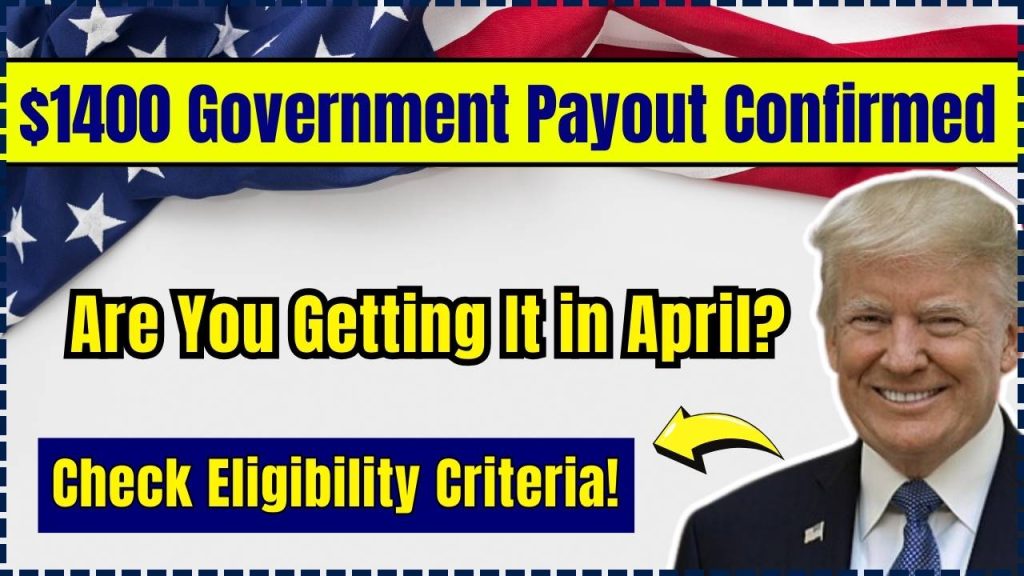
$1400 Government Payout Confirmed: Many Americans may still be eligible to receive a $1400 IRS stimulus check in 2025—but only if they act before the upcoming deadline on April 15, 2025. This payout isn’t part of a new relief plan, but rather a second chance to claim the Recovery Rebate Credit tied to the third round of Economic Impact Payments from 2021. If you missed out due to not filing a return, income changes, or life events like having a child, you could still be entitled to this significant amount.
The IRS recently revealed that nearly 1 million eligible taxpayers failed to claim this credit. While this missed opportunity might sound discouraging, the good news is that there’s still time to act. But it’s a strict deadline—if you don’t claim it by April 15, the money will revert back to the U.S. Treasury, meaning you lose it permanently. That’s why understanding your eligibility and the steps to claim this credit is more important than ever.
$1400 Government Payout Confirmed
| Key Details | Summary |
|---|---|
| Payout Amount | Up to $1,400 per eligible person |
| Deadline to Claim | April 15, 2025 |
| Eligibility Requirements | U.S. citizen/SSN holder, not a dependent, income below threshold |
| How to Claim | File a 2021 tax return |
| Income Limits for Full Payment | $75,000 (single), $150,000 (married), $112,500 (head of household) |
| Official IRS Link | IRS.gov – Recovery Rebate Credit |
The $1400 Recovery Rebate Credit represents a real financial lifeline for many Americans who slipped through the cracks during the pandemic. Whether you’re an everyday taxpayer, a gig worker, a college student, or a retiree, the opportunity to claim this money is real—but time is limited.
The IRS has made it clear: No action means no payment. Take the time now to review your 2021 tax filing status. If you’re eligible, don’t wait. Claim your $1,400—and if you have dependents, the total could be even more.
It’s free. It’s easy. And it could be one of the most important financial moves you make this year.
What is the $1400 Recovery Rebate Credit?
The Recovery Rebate Credit is a tax credit created to help individuals and families who did not receive the full amount of the third stimulus check issued during the COVID-19 pandemic. This round of stimulus was passed under the American Rescue Plan Act of 2021 and was valued at up to $1,400 per eligible adult and dependent.
While the majority of eligible individuals automatically received their payments via direct deposit, paper check, or EIP card, many did not. Reasons include:
- A significant drop in income in 2021 compared to previous years
- New dependents added to the household (such as a newborn)
- People who were non-filers and didn’t claim the credit on their tax return
If any of these situations applied to you or someone you know, this rebate credit might still be on the table.
Who Is Eligible for the $1400 Government Payout?
To successfully claim the Recovery Rebate Credit, certain eligibility requirements must be met. You must:
- Be a U.S. citizen or resident alien
- Have a valid Social Security number
- Not be listed as a dependent on someone else’s tax return for 2021
- Have income that meets the required threshold
Income thresholds for full eligibility:
- Single filers: Up to $75,000
- Married filing jointly: Up to $150,000
- Head of Household: Up to $112,500
As income increases above these limits, the payment phases out and eventually becomes unavailable.
It’s also important to note that people in certain gray areas—such as those on disability or low-income individuals who don’t normally file—can still qualify, but they need to submit a 2021 tax return to get their credit.
How to Claim Your $1400 Government Payout
Even if taxes aren’t your thing, this process is straightforward. Here’s a breakdown of how to get your money.
Step 1: Gather 2021 Tax Documents
You’ll need:
- W-2s or 1099s for any 2021 income
- IRS Letter 6475, which states how much you already received (if any)
- Bank details for direct deposit (optional but speeds up payment)
Step 2: File or Amend Your 2021 Tax Return
- Didn’t file in 2021? You must file a full 2021 tax return.
- Already filed, but missed the credit? You’ll need to file an amended return using Form 1040-X.
You can file either electronically or by mail, but e-filing is faster, safer, and preferred by the IRS.
Step 3: Use IRS Free File Tools
If your income was under $73,000 in 2021, you qualify for IRS Free File, a partnership between the IRS and tax software providers that lets you file your federal return for free.
Step 4: Track Your Payment
Once your return is submitted, use the Where’s My Refund tool to track your payment status. Be sure to keep a copy of your filed return for your records.
What Happens If You Don’t File by April 15, 2025?
If you miss the April 15, 2025 deadline, you forfeit the right to claim the Recovery Rebate Credit. The IRS will not issue retroactive payments beyond that date. In essence, the money goes back to the government, even if you were eligible.
This is one of those cases where procrastination can cost you dearly. Filing takes just a few hours—but could return up to thousands of dollars, especially if you’re claiming for yourself and eligible dependents.
Real-Life Example: Why Filing Matters
Let’s take Maria, a part-time grocery store clerk who earned under $12,000 in 2021. Because she didn’t earn enough to file a return, she assumed she wasn’t eligible. But Maria never received her third stimulus check. Now, she learns she could get the full $1,400 if she simply files her 2021 tax return.
She uses the IRS Free File tool and completes her return in under an hour. Within weeks, the IRS issues her the payment via direct deposit. Had she waited until after April 15, 2025, she would have missed her shot.
Why This Opportunity Matters for Professionals
If you’re a financial advisor, tax preparer, or accountant, this is a great chance to bring real value to your clients. Reminding eligible individuals—especially low-income seniors, gig workers, and part-time employees—to retroactively file could put significant cash in their pockets.
Professionals working with community groups, nonprofits, or student financial services should also flag this opportunity. Millions of people may simply be unaware they can still claim the money. A simple conversation or outreach campaign can make a real difference.
$1000 Direct Payment for Americans in 2025: Check Payment Dates and Eligibility Criteria
Social Security to Pay $5,108 in April 2025 – Are You Eligible To Get it?
FAQs About $1400 Government Payout Confirmed
Who should file?
Anyone who didn’t get the full $1,400 stimulus check and meets the eligibility requirements should file a 2021 tax return.
Can I still get the payment if I have no income?
Yes. Even if you had zero income in 2021, you can still file a return and receive the full credit if you meet the other criteria.
Are dependents eligible for their own $1400?
Yes. Dependents like children or elderly parents do qualify, but the payment goes to the taxpayer who claims them.
I got some of the stimulus—can I get the rest?
Absolutely. If you only received a partial third stimulus, the Recovery Rebate Credit allows you to claim the difference.
What tax forms do I need?
Use Form 1040 for your initial filing. If you’re amending a return, file Form 1040-X.
Is this money taxable?
No. The credit is not considered taxable income, so it won’t affect your tax bill or benefits.











